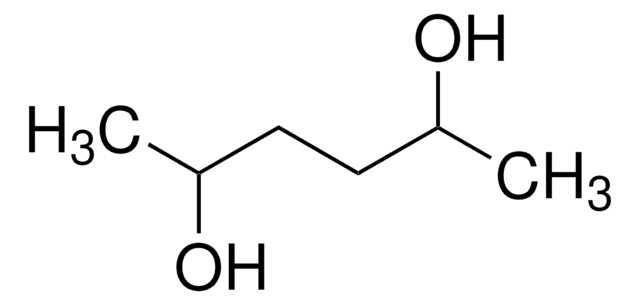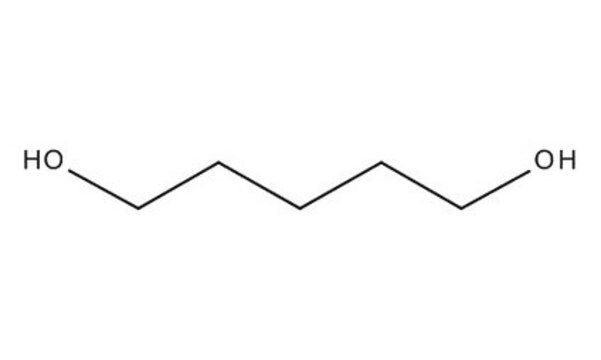240117
1,6-Hexanediol
99%
Synonym(s):
Hexamethylene glycol
Sign Into View Organizational & Contract Pricing
All Photos(2)
About This Item
Linear Formula:
HO(CH2)6OH
CAS Number:
Molecular Weight:
118.17
Beilstein:
1633461
EC Number:
MDL number:
UNSPSC Code:
12162002
PubChem Substance ID:
NACRES:
NA.23
Recommended Products
vapor pressure
0.53 mmHg ( 20 °C)
Assay
99%
autoignition temp.
608 °F
expl. lim.
16 %
bp
250 °C (lit.)
mp
38-42 °C (lit.)
SMILES string
OCCCCCCO
InChI
1S/C6H14O2/c7-5-3-1-2-4-6-8/h7-8H,1-6H2
InChI key
XXMIOPMDWAUFGU-UHFFFAOYSA-N
Looking for similar products? Visit Product Comparison Guide
General description
1,6-hexanediol is a versatile chemical compound commonly used in the polymer industry. It is used as a building block or monomer for the synthesis of various polymers and polymer-based materials. For instance, it can be used in the production of polyesters, polyurethanes, and polyamides, among others. These polymers find applications in a wide range of industries, including automotive, textiles, coatings, adhesives, and sealants.
Application
1,6-Hexanediol can be used for a variety of applications such as:
- a structure-directing agent for the synthesis of ZSM-5 zeolite
- a solvent for titanium tetra-isopropoxide to form titanium oxide (TiO2) nanocrystals
- a phase change material in combination with lauric acid for thermal energy storage applications
Storage Class Code
11 - Combustible Solids
WGK
WGK 1
Flash Point(F)
215.6 °F - closed cup
Flash Point(C)
102 °C - closed cup
Personal Protective Equipment
dust mask type N95 (US), Eyeshields, Gloves
Certificates of Analysis (COA)
Search for Certificates of Analysis (COA) by entering the products Lot/Batch Number. Lot and Batch Numbers can be found on a product’s label following the words ‘Lot’ or ‘Batch’.
Already Own This Product?
Find documentation for the products that you have recently purchased in the Document Library.
Customers Also Viewed
Microwave-driven polyol method for preparation of TiO2 nanocrystallites
Yamamoto T, et al.
Chemistry Letters (Jpn), 31(10), 964-965 (2002)
Guido van Mierlo et al.
Cell reports, 34(5), 108705-108705 (2021-02-04)
Membraneless organelles are liquid condensates, which form through liquid-liquid phase separation. Recent advances show that phase separation is essential for cellular homeostasis by regulating basic cellular processes, including transcription and signal transduction. The reported number of proteins with the capacity
Giorgio Gaglia et al.
Nature cell biology, 22(2), 151-158 (2020-02-06)
Under proteotoxic stress, some cells survive whereas others die. The mechanisms governing this heterogeneity in cell fate remain unknown. Here we report that condensation and phase transition of heat-shock factor 1 (HSF1), a transcriptional regulator of chaperones1,2, is integral to
H D Durham et al.
Muscle & nerve, 11(2), 160-165 (1988-02-01)
We reported previously that 2,5-hexanedione (2,5-HD), the neurotoxic metabolite of methyl-n-butylketone (MnBK) and n-hexane, induced aggregation of intermediate filaments of the vimentin type in cultured fibroblasts. To determine if these findings have relevance to the mechanism by which these hexacarbons
Sreejith J Nair et al.
Nature structural & molecular biology, 26(3), 193-203 (2019-03-06)
A crucial feature of differentiated cells is the rapid activation of enhancer-driven transcriptional programs in response to signals. The potential contributions of physicochemical properties of enhancer assembly in signaling events remain poorly understood. Here we report that in human breast
Our team of scientists has experience in all areas of research including Life Science, Material Science, Chemical Synthesis, Chromatography, Analytical and many others.
Contact Technical Service










